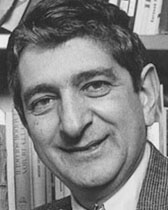Irwin Weil
Professor Emeritus

Irwin Weil was born in 1928, on the banks of the Ohio River - Cincinnati, Ohio. He received his bachelor and master's degrees from the University of Chicago and his Ph.D. from Harvard University, including work under Roman Jakobson and Renato Poggioli. He has also worked in the professional theatre both on and off Broadway, together with the renowned German director, Erwin Piscator, who first put Berthold Brecht on the Berlin Stage.
He worked for three years under the eminent demographer, Evgenij Mikhailovich Kulischer, who made the widely accepted calculation of the hideous population losses during World War II. At the Library of Congress Weil worked for three years on the project to make an accurate census for the USSR in the early 1950s. "We later discovered that the USSR used many of our figures".
He started teaching at Harvard University, continued at the then young Brandeis University, and came to Northwestern University in January of 1966. By that time he had already been travelling and working in the USSR for six years. He had already laid the foundation for his future work in USA-USSR/Russia relations.
In 1966 he was the American representative at the Paris conference which started the International Association of Teachers of Russian and Russian Literature (MAPRIAL). Out of this came the extensive exchange of students and scholars between the two countries, an influx of fresh air into the previously hermetically sealed container of Soviet Russian philologists. Cooperation was strong on both sides, in spite of efforts, also on both sides, to prevent the scholarly and pedagogical contacts. Many were the scholars and seminars organized to bring about closer relations on both sides.
He also participated in many Soviet, later Russian, projects to bring public attention to Russian culture and its relations with American culture. He instigated, together with Soviet friends, a TV competition in knowledge of world literature, between Soviet and American High School students, with each group visiting the other, first in Moscow, then in Chicago. The programs were seen by over three million Soviet viewers, as well as some American viewers.
Professor Weil and his Russian counterpart, Professor Marina Kaul, assisted in establishing the American Studies Center at Moscow Humanities University. With the cooperation of many Russian and American specialists, from many different institutions, the center shines a unique light on the work of American specialists in both countries.
Professor Weil was active in working on Russian Music in the context of Russian culture. He established a unique course, which included both study of literary sources and public performance, by students, of difficult but deeply moving Russian operas. In this project, he worked together with Dr. Natalia Lyashenko, of the Northwestern University Music School.
In all of his work, Professor Weil has maintained close relations with literally thousands of students, and he values this work very highly.
In 2015, Professor Weil's intercultural experiences and autobiography were featured in The Daily Northwestern.
Courses
- Freshman Seminar: Tolstoy and the Bible. A comparison and discussion of two enormous artistic universes with lasting influence on human understanding.
- Dostoevsky - three novels and a novella by the great 19th century master - artistic works which have shaken the world of literature.
- Russian prose taught in the Russian language. A course to improve students' mastery over Russian and their understanding of classical Russian prose.
- Introduction to Eastern European Jewish Culture. An investigation of Eastern European Jewish languages, intellectual and religious movements, literature, music, and questions which move the world today.
- Introduction to the USSR and Successor States. An investigation of Soviet and post-Soviet cultural and political history, using history texts, literature, film, and extensive experience of the Professor in the USSR/Russia.
- Slavic 350 Folklore, Music, Poetry
Research interests:
- Russian literature and cultural history
- Jewish literature and cultural history
- Relations between poetry and music, literature and music
- USSR/Russia-USA cultural relations and exchange - extensive teaching, research, and work in the USSR and Russia - periodic lecturing and teaching in Russia, for forty years
Publications:
- books and articles on Gorky and Soviet literature
- articles on Russian poetry, poetry and music
- articles on Russian cultural history
- articles on problems of artistic translation
- memoirs of recent history and cultural events
